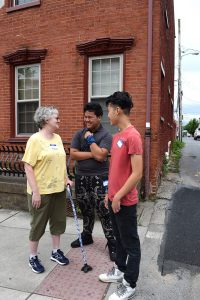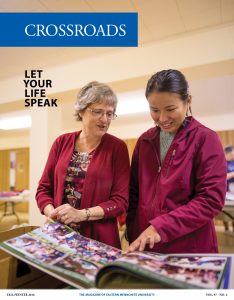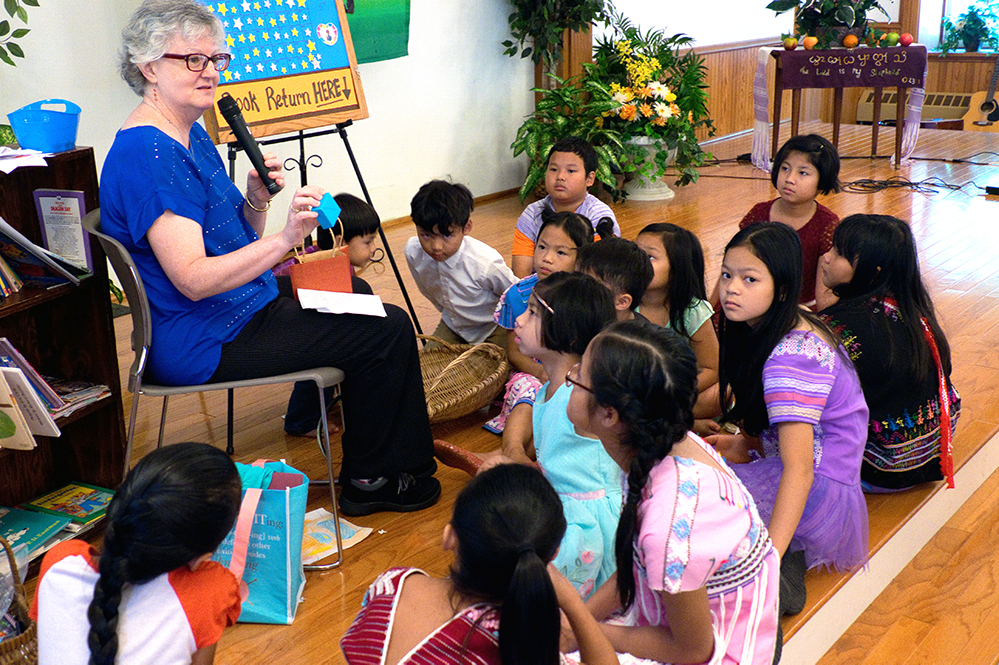Before moving to Lancaster County 18 years ago, Donna Becker had little exposure to Mennonites. In fact, she was not aware that she had ever met a Mennonite until she began studies with Eastern Mennonite Seminary in 2015. Becker spent most of her life in the Baltimore area, in the Lutheran and United Church of Christ traditions.

From left: Donna Becker talks with youth from Habecker Mennonite Church, Naykaw
Htoo, 17, and Christ Hay, 15, in Lancaster City, Pa. (Photo by Tammy Evans)
This summer, Becker’s understanding of Mennonite identity was expanded when she met the people of Habecker Mennonite Church in Lancaster. From May to August, Becker served this congregation as a refugee ministry intern with Eastern Mennonite Missions (EMM).
As a requirement for graduation, Becker needed a cross-cultural experience. Having explored a variety of international options, she was encouraged to look at some local options. Sherrie Ober, EMM personnel placement coach, was able to connect Becker with Habecker Mennonite Church.
This congregation traces its roots to 1724 when Mennonites purchased a tract of land from the sons of William Penn. For nearly three centuries, it was a community of parishioners with European heritage.
In 2008, the church decided to support a Karen refugee family. The warm and welcoming hospitality of those church members brought more Karen families to the church. Ten years later, Karen people make up three-quarters of Habecker Mennonite Church’s membership.
Helping other people “whether in the local church or in a foreign country, is not something [Mennonites] have to think about; it’s just something they do,” Becker observed.
As a result of persecution in Burma (also known as Myanmar), ethnic groups like the Karen were forced to flee the country, many traveling to refugee camps in Thailand.
“Reading and hearing about the Karen people’s struggles for survival for so many years, I would expect to hear this bitterness and unhappiness expressed by them,” said Becker. Despite the tragic circumstances many have undergone, she realized that the Karen people in this congregation “use many occasions in their lives to worship God, not just on Sunday mornings.”
Becker got to know many of the Karen church members who were grateful to be part of this loving congregation. Sah Klu, a new friend of Becker, shared that coming to Habecker Mennonite Church has been like heaven for her.
“As the Karen choir sang, I marveled at the strength of these men and women,” Becker recalled from her experience in a Sunday worship service. “They have come to a foreign country, leaving behind their families and friends, and many horrible experiences in Burma and Thailand. But they seem so resilient and confident … so joyous.”

Seeking refuge in a new place is a significant part of the Mennonite story. Hundreds of years of religious persecution led Anabaptists to also find refuge in places like Pennsylvania.
In conversation with Miriam Charles, one of the English-speaking members of the congregation, Becker asked why Charles was so willing to support the first Karen family. Charles indicated that she had grown up in a home and a church that had significant missionary connections, which influenced her hospitality toward the Karen people.
Becker wanted to know if there was any resistance to the Karen refugees coming to the church. Charles responded, “No, we were delighted! We thought the church was going to die. We were happy they were coming!”
The Fall/Winter 2016 issue of Crossroads (at right) features an article about alumna Rhoda Charles, Miriam’s daughter-in-law, and the Karen refugees at Habecker Mennonite Church.
The church uses both the Karen and English languages during worship services. In her conversation with Charles, Becker asked what it felt like to be in a service and not understand the language. Charles shared that it was initially difficult, but to her, the church is about fellowship, not about whether or not someone speaks the same language.
Unable to speak the Karen language, Becker was uncertain about how she could make a difference or learn anything from this internship. However, when she concluded her internship, she realized, “Language is not the most important thing in a relationship if God is part of that relationship.” The people of Habecker Mennonite Church were like “the face of God” to Becker.
Becker and her husband began attending New Danville Mennonite Church earlier this year. A second-career seminary student, Becker is finishing a Master of Divinity program at Eastern Mennonite Seminary at Lancaster. In her previous career, she was a teacher — she now works for Landis Communities in Lititz, Pa.
